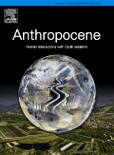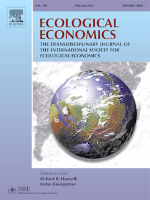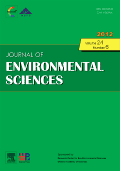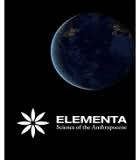
Anthropocene
Scope & Guideline
Transforming Knowledge into Action for Planetary Change
Introduction
Aims and Scopes
- Socio-Ecological Interactions:
The journal emphasizes research that investigates the interplay between human societies and ecological systems, exploring how socio-economic factors influence environmental changes and vice versa. - Climate Change Impacts:
A significant focus is on understanding the impacts of climate change across various ecosystems, including assessments of vulnerability, adaptation strategies, and mitigation efforts. - Land Use and Management:
Studies addressing the effects of land-use changes, agricultural practices, and urbanization on ecosystems are prominently featured, emphasizing sustainable management practices. - Historical and Paleoecological Studies:
The journal includes research that reconstructs past human-environment interactions through paleoecological data, providing insights into long-term environmental changes. - Innovative Solutions and Policy Implications:
There is a commitment to exploring nature-based solutions and policy frameworks that address urban and environmental challenges, contributing to sustainable development.
Trending and Emerging
- Nature-Based Solutions:
There is a growing emphasis on nature-based solutions to urban and environmental challenges, indicating an increased interest in sustainable practices that leverage natural processes. - Urban Resilience and Adaptation:
Research focused on urban environments, particularly how cities can adapt to climate change impacts and enhance resilience to environmental stresses, is on the rise. - Anthropogenic Effects on Biodiversity:
Emerging studies are increasingly addressing how human activities affect biodiversity and ecosystem functioning, highlighting the urgency of conservation efforts. - Integrative Climate and Socioeconomic Modeling:
There is a trend towards using integrated models that connect climate change impacts with socioeconomic variables, providing a comprehensive understanding of the challenges faced. - Environmental Justice and Equity:
Research exploring the intersections of environmental issues with social equity and justice is gaining traction, reflecting a broader societal push for inclusive and equitable solutions.
Declining or Waning
- Traditional Industrial Impact Studies:
Research focusing solely on the negative impacts of industrialization on the environment appears to be waning, as more studies now emphasize integrated socio-ecological approaches. - Single-Factor Environmental Assessments:
There is a noticeable decline in studies that analyze environmental issues in isolation, with a shift towards multi-faceted analyses that consider various interacting factors. - Historical Analysis of Climate Change Causes:
While historical climate studies remain relevant, there is less emphasis on purely historical analyses without contemporary relevance or application to current challenges. - Localized Environmental Issues:
Research focusing narrowly on local environmental problems without broader implications or connections to global issues is becoming less common, reflecting a trend towards more globally relevant studies.
Similar Journals

Trees Forests and People
Exploring the Vital Connections Between Nature and HumanityTrees, Forests and People is an esteemed peer-reviewed journal published by Elsevier that commenced its journey in 2020 and focuses on the intricate relationships between trees, forests, and human communities. With its E-ISSN of 2666-7193, this journal serves as a vital platform for presenting cutting-edge research in disciplines such as forestry, environmental science, and management. Recognized for its impact within the academic community, it has achieved a prestigious Q1 ranking in both Economics, Econometrics and Finance (Miscellaneous) and Forestry, alongside a Q2 ranking in Management, Monitoring, Policy and Law as of 2023. Its Scopus rankings indicate robust positioning in various fields, appealing to a diverse audience of researchers, professionals, and policy-makers engaged in sustainable forest management and ecosystem services. By offering open access options, the journal ensures that critical findings are readily available to a global audience, fostering knowledge sharing and collaborative efforts aimed at addressing the pressing challenges in forest conservation and management.

ECOLOGICAL ECONOMICS
Empowering Research for Sustainable Environmental Policies.ECOLOGICAL ECONOMICS, published by ELSEVIER, stands as a premier journal dedicated to the integration of ecological and economic thinking, exploring the complex interactions between human and natural systems. With an impactful history dating back to 1989, the journal has solidified its position in the academic community, evidenced by its classification in the top quartiles (Q1) of both Economics and Econometrics and Environmental Science categories for 2023. ECOLOGICAL ECONOMICS boasts impressive Scopus rankings, holding the 32nd position out of 716 in Economics and Econometrics and 19th among 233 in General Environmental Science, reflecting its substantial influence and reach. Although it does not currently offer open access options, the journal remains a vital resource for researchers, professionals, and students interested in sustainable development, environmental policy, and resource management. The ongoing convergence of various fields within ecological economics promises to yield valuable insights and foster interdisciplinary collaboration, making this journal an essential component of scholarly discourse.

Earth System Dynamics
Bridging Science and Society for a Greener TomorrowEarth System Dynamics is a premier academic journal dedicated to advancing our understanding of the intricate interactions within the Earth system, encompassing atmospheric, hydrological, geological, and biological processes. Published by COPERNICUS GESELLSCHAFT MBH in Germany, this Open Access journal has been fostering scholarly communication since its inception in 2010, allowing unrestricted access to vital research findings. With an impressive Impact Factor and a ranking of #7 out of 195 in the field of Earth and Planetary Sciences, as well as being categorized in the Q1 quartile, Earth System Dynamics stands at the forefront of its discipline. Researchers, professionals, and students alike benefit from its comprehensive scope, which covers various aspects of Earth system science and its implications for climate change and sustainability, making it an indispensable resource for anyone invested in the environmental challenges of our time. As the journal continues to converge remarkable insights up to 2024, contributors and readers alike are encouraged to engage with this vital ongoing conversation.

Journal of Environmental Sciences
Leading the Way in Multidisciplinary Environmental ResearchJournal of Environmental Sciences, published by SCIENCE PRESS, is a premier scholarly journal dedicated to advancing knowledge in the multidisciplinary fields of environmental science, environmental chemistry, and environmental engineering. Established in 1970 and based in Beijing, China, this journal has consistently garnered recognition for its high-quality research, demonstrated by its Q1 rankings across multiple categories, including Environmental Chemistry, Environmental Engineering, and General Environmental Science. With an impressive Scopus rank of #11 for Environmental Science, the journal has firmly positioned itself within the top tier of its field, attracting contributions from leading researchers and academics worldwide. Although it operates under subscription access, the journal's commitment to disseminating critical insights into pressing environmental issues makes it an invaluable resource for professionals, researchers, and students striving to make impactful contributions to the understanding and management of environmental challenges.

BIOLOGY AND ENVIRONMENT-PROCEEDINGS OF THE ROYAL IRISH ACADEMY
Connecting Ideas, Inspiring Change in the Natural WorldBIOLOGY AND ENVIRONMENT - PROCEEDINGS OF THE ROYAL IRISH ACADEMY serves as a vital platform for advancing knowledge in the rapidly evolving fields of biological and environmental sciences. Published by the esteemed Royal Irish Academy, this journal, with an ISSN of 0791-7945 and an E-ISSN of 2009-003X, offers a rich compilation of research articles, reviews, and proceedings that cater to the academic community in Ireland and beyond. Since its inception in 1993 and continuing through to 2024, the journal has positioned itself as a valuable resource within the Q4 category in Agricultural and Biological Sciences and Environmental Science, as detailed by the 2023 Scopus rankings. While not currently offering open access, its contributions significantly impact understanding and discussions surrounding ecological and biological challenges. Researchers, professionals, and students alike will find that the journal not only reflects current trends, but also pushes the boundaries of research, making it an essential read for anyone invested in the study of the natural world.

Journal of Integrative Environmental Sciences
Exploring vital insights for a healthier planet.Journal of Integrative Environmental Sciences, published by Taylor & Francis Ltd, stands as a pivotal platform for researchers and professionals in the fields of Environmental Science and Public Health. With an impact factor reflecting its significance in the academic community, this Open Access journal has been democratizing access to cutting-edge research since 2016, enhancing visibility and dissemination of vital insights. The journal covers a wide scope, converging studies from 2010 to 2024, and holds esteemed rankings in Q2 quartiles for Environmental Science and Public Health, indicating its substantial contribution to these critical fields. With Scopus rankings placing it favorably among its peers, researchers benefit from a diverse array of articles addressing pressing environmental and health issues, sustainability, and renewable energy. As an essential resource for advancing knowledge and fostering innovation, the Journal of Integrative Environmental Sciences encourages contributions that span interdisciplinary approaches to solving some of the most challenging environmental dilemmas of our time.

Elementa-Science of the Anthropocene
Empowering researchers to shape sustainable solutions.Elementa: Science of the Anthropocene is an esteemed Open Access journal published by University of California Press, dedicated to advancing interdisciplinary research that addresses the complexities of the Anthropocene epoch. Since its inception in 2013, it has established itself as a leading platform for the dissemination of innovative ideas across several disciplines, including atmospheric science, ecology, environmental engineering, geology, geotechnical engineering, and oceanography, achieving Q1 status in each of these fields as of 2023. With an impact factor reflecting its significant contribution to the scholarly community, Elementa ranks favorably in various Scopus categories, being placed in the 88th percentile in Earth and Planetary Sciences for both Geology and Oceanography. The journal's open-access model ensures that valuable research findings are accessible to a broader audience, fostering collaboration among researchers, professionals, and students dedicated to tackling pressing environmental challenges. Located in Oakland, California, Elementa continues to uphold a mission that underscores the importance of sustainable solutions and comprehensive understanding of the Anthropocene.

TeMA-Journal of Land Use Mobility and Environment
Advancing sustainable solutions for urban landscapes.TeMA - Journal of Land Use Mobility and Environment is a distinguished open-access journal published by the University of Naples Federico II, specifically by the Department of Planning and Territorial Science. Since its inception in 2008, the journal has dedicated itself to advancing the field of land use, mobility, and environmental studies, providing a platform for innovative research that shapes urban planning and environmental management practices. With an ISSN 1970-9889 and E-ISSN 1970-9870, the journal is committed to offering high-quality, peer-reviewed articles that address critical issues impacting society. Although currently positioned in the lower percentiles of Scopus rankings across various categories, including Geography, Planning and Development and Environmental Science, it plays a vital role in disseminating knowledge that is essential for researchers, policy-makers, and practitioners in these disciplines. Nestled in the heart of Naples, Italy, at Piazzale Tecchio 80, TeMA invites submissions from scholars around the world, fostering a collaborative atmosphere that emphasizes the importance of sustainable land use and mobility in the contemporary environment.

Earths Future
Advancing Knowledge for a Sustainable FutureEarth's Future, published by the American Geophysical Union, is a distinguished open-access journal that has been fostering scholarly communication since 2013. With an impressive Q1 ranking in both Earth and Planetary Sciences and Environmental Science for 2023, this journal stands at the forefront of disseminating cutting-edge research. Its comprehensive scope covers integral topics essential for understanding the dynamics of our planet and the complexities of environmental changes. Housed in the United States, Earth's Future is particularly valuable for researchers and professionals dedicated to addressing pressing global issues through interdisciplinary approaches. The journal's remarkable Scopus rankings—4th among 159 in Earth and Planetary Sciences and 26th among 233 in General Environmental Science—highlight its influence and the high-quality contributions it publishes. By providing open access since its inception, Earth's Future ensures that innovative findings are readily available to a global audience, fostering collaboration and knowledge-sharing essential for tackling tomorrow's challenges.

Forestist
Pioneering research that nurtures our forests.Forestist, published by AVES, is a pivotal open-access journal dedicated to the field of Forestry, providing a platform for researchers, professionals, and students to explore cutting-edge developments and research within the discipline since 1980. Operating from Turkey, this journal offers a unique opportunity for scholars to share their findings with a broad audience, contributing to the global discourse on sustainable forest management, conservation practices, and ecological research. With an impressive impact factor and a current categorization in the Q3 quartile for 2023, Forestist ranks among the essential resources in Agricultural and Biological Sciences, particularly within the realm of Forestry, as indicated by its Scopus ranking of #119 out of 174 journals. This publication is committed to fostering open access to knowledge, making research freely available while encouraging innovative studies that address the pressing challenges in forestry and environmental science.